What to expect when you're electing
- Published
The 2015 general election campaign is officially under way - what can we expect from the next month or so?
The basics
The UK goes to the polls on Thursday, 7 May
Voting takes place in all 650 Parliamentary constituencies
The closest contest in decades with Labour and the Conservatives neck-and-neck in the opinion polls
Local elections scheduled to take place on the same day across most of England
The deadline for registering to vote is Monday, 20 April

TV debates
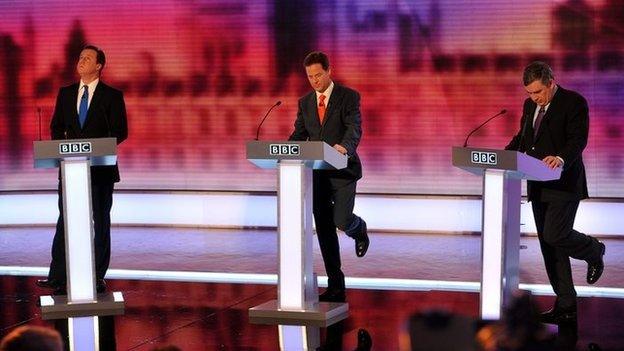
They dominated the 2010 campaign but due to wrangling between the broadcasters and the parties - and David Cameron's refusal to take part in a head-to-head clash with Ed Miliband - they will play a much smaller role this time. Here's the schedule:
2 April: Debate with seven party leaders, including Ed Miliband and David Cameron, on ITV, moderated by Julie Etchingham
16 April: "Challenger debate" between five opposition party leaders - Labour, SNP, UKIP, the Green Party and Plaid Cymru - on the BBC, moderated by David Dimbleby
30 April: BBC Question Time programme with David Cameron, Ed Miliband and Nick Clegg being grilled in separate half-hour segments, presented by David Dimbleby
David Cameron and Ed Miliband have already taken part in a live question and answer programme on Channel 4 and Sky News, presented by Jeremy Paxman and Kay Burley.

High-profile contests
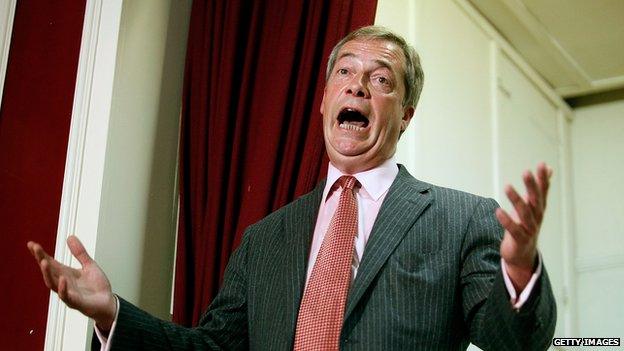
Nigel Farage has said he will quit as UKIP leader if he fails to win in the Kent coastal seat of South Thanet - but he faces a tough fight, with polls suggesting he is in a three-way battle with Labour and the Conservatives. Pub Landlord comedian Al Murray, standing for the Free United Kingdom Party, should ensure a few laughs.
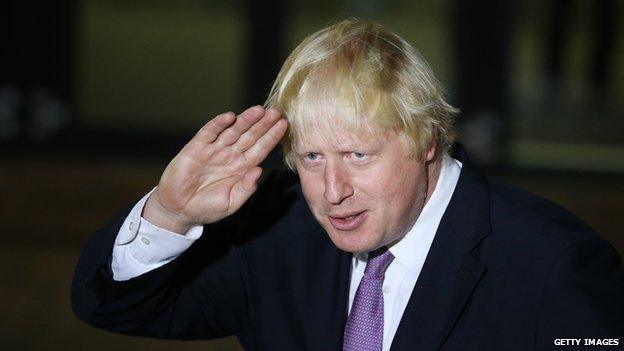
London mayor Boris Johnson is favourite to emerge victorious in what has been a Conservative seat in recent years, in Uxbridge, in West London. If he does win and David Cameron fails to remain in No 10, it would mean he arrives back in the Commons just in time for a potential Tory leadership contest.
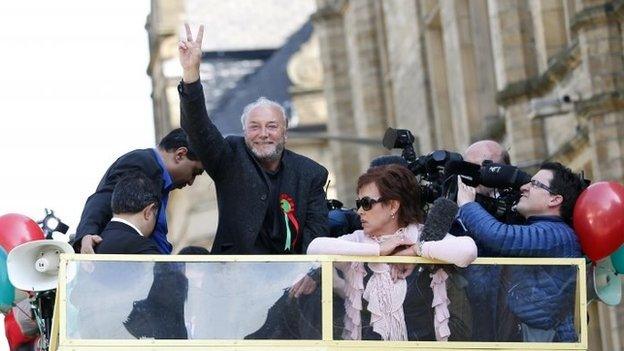
Few politicians relish an election campaign like Respect MP George Galloway. Labour's attempt to take back his Bradford West seat got off to a disastrous start when its candidate was forced to stand down. Her replacement, Naz Shah, has an unusual, and tragic, personal story, external, making for a fascinating contest.

Potential Portillo moments
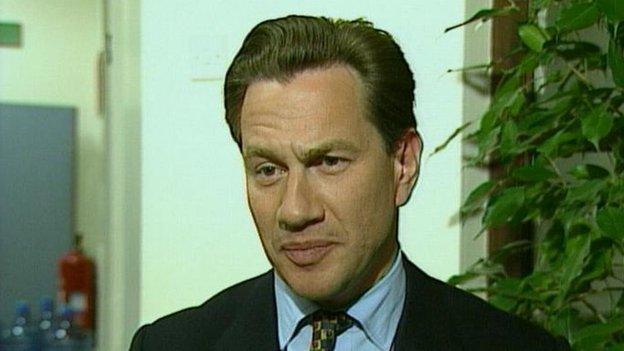
The shock unseating of Tory minister Michael Portillo in Tony Blair's 1997 landslide has become a byword for election upsets. Here are some of the big names battling to hold on to their seat this time:
Nick Clegg - the Lib Dem leader has a huge majority in Sheffield Hallam - just like Michael Portillo had in his Enfield South constituency. Polling in the constituency suggests Mr Clegg could be unseated by the Labour candidate but the Lib Dem leader insists he's going to win.
Danny Alexander - another big Lib Dem figure, with a healthy majority, who is fighting for his political life. The SNP are snapping at the Treasury Secretary's heals in Nairn, Badenoch and Strathspey.
Douglas Alexander - Labour's campaign chief and shadow foreign secretary has a big majority but faces a real challenge from 20-year-old SNP candidate Mhairi Black in Paisley and Renfrewshire.
Esther McVey - the employment minister, who attends cabinet, is currently the only Conservative MP on Merseyside. But with a slender 2,436 majority in Wirral West she has a fight on her hands against Labour.

Hard hats and hi-vis jackets
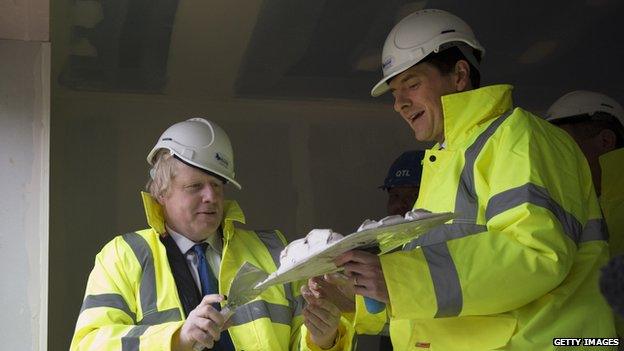
"Look at us! We are building homes! For hard-working families!". The building site or factory floor photo opportunity ticks a lot of boxes for the modern politician. Chancellor George Osborne recently toyed with the idea of wearing a hard hat to visit a hard hat factory - as a "postmodern" joke.

Find the gap
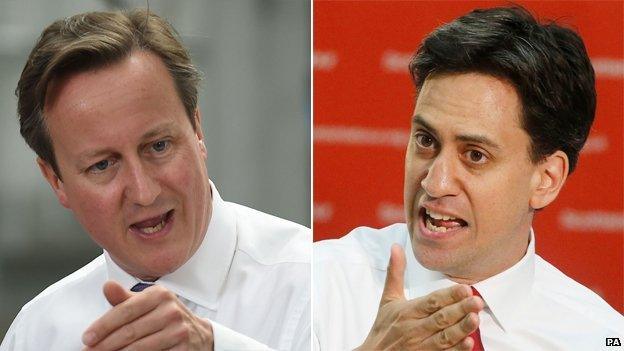
The Conservatives and Labour have been neck-and-neck for months in the polls. When will one of them start to pull ahead? YouGov polling guru Peter Kellner reckons the long Easter Weekend could be the decisive moment, particularly if there is a TV debate on 2 April. Others think a gap will only start to open up a few days before the country goes to the polls - or not at all.

Baffled pundits
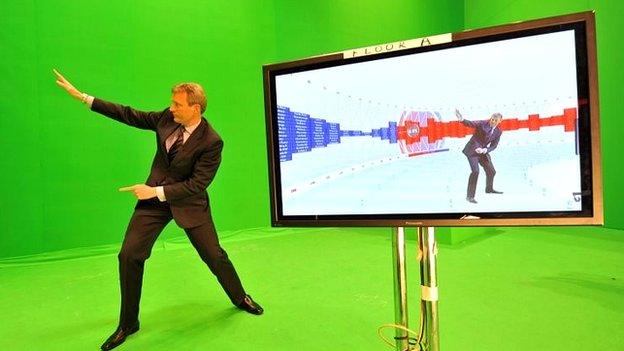
Only a fool would predict the outcome of this general election, which makes life difficult for those whose job it is to do just that. The experts in charge of producing an exit poll - to be announced jointly by the BBC, ITV and Sky when voting ends on 7 May - face a particularly tough task. The exit poll is based on a survey of voters emerging from the same 130 polling stations at every election, so trends can be worked out. But the rapid rise of UKIP, the SNP and, to a lesser extent, the Greens, will play havoc with their calculations. The days when it was simply a matter of working out the "swing" between Labour and the Conservatives are long gone.

Angry locals
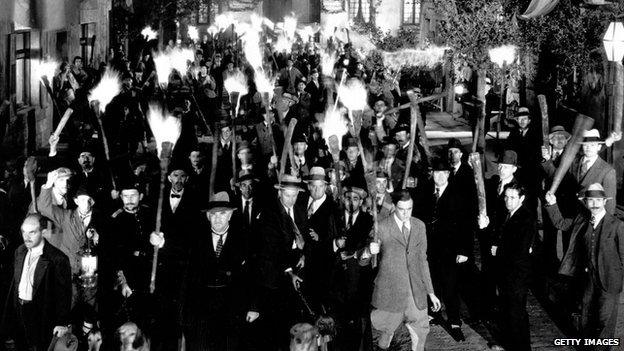
Regional loyalties matter more than ever in British politics. The North is close to being a Tory-free zone, while Labour has hardly any seats in the South, outside of London. There is also a visceral anti-Westminster mood in many parts of the country. What sort of reception will the party leaders - and the London-based media - get when they venture out of their comfort zones?

Red lines
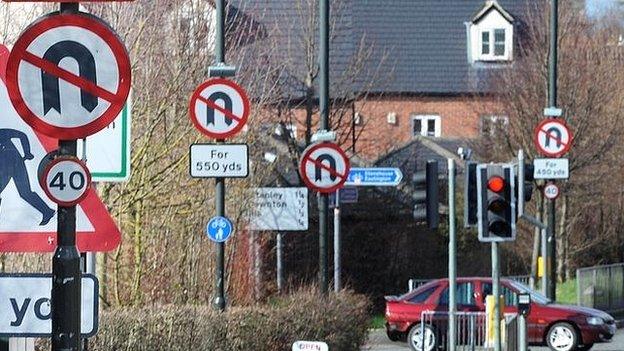
In 2010, nobody talked much about the prospect of post-election deals or coalitions, in public at least. This time the campaign sounds increasingly like someone trying to get a good deal on a new car. The smaller parties - from UKIP to the SNP - all have optional extras they want included in the price of a post-election pact with Labour or the Conservatives. The Lib Dems - who refused to countenance such talk in 2010 - have even put theirs on the front page of their manifesto. But which ones will they absolutely insist on? What are their "red lines"?

Personal attacks
Not since the days of Neil Kinnock and John Major has "character" been such an issue at an election. The Conservatives are doing their best to portray Ed Miliband as a socially inept oddball, reliant on Alex Salmond, compared with the self-assured, prime ministerial David Cameron. But Labour can also play rough. Their "Un-credible shrinking man" video from last year was a merciless attack on Nick Clegg and caricatured the Tories as heartless toffs. The firm that made that clip, Lucky Generals, has been retained by Labour for the campaign. The parties are off the leash - they can fire out attack ads on social media without having to worry about broadcasting rules and party election broadcasts (although we will still get those). It's going to get nasty.

Real life
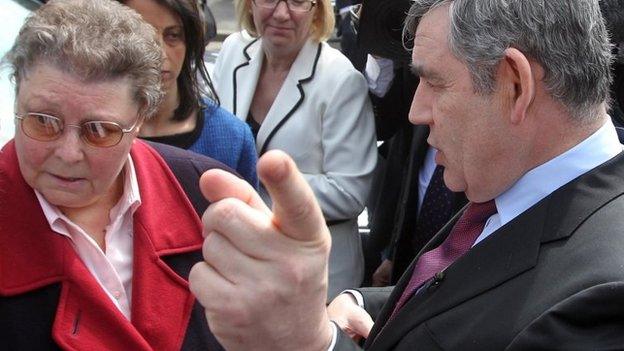
From the "Prescott punch" in 2001 to Gordon Brown's career-ending conversation with, and subsequent apology to, "bigoted woman" Gillian Duffy in 2010, it is always the voters that create the most memorable election moments. However hard the parties try to stage manage things, reality always triumphs.
